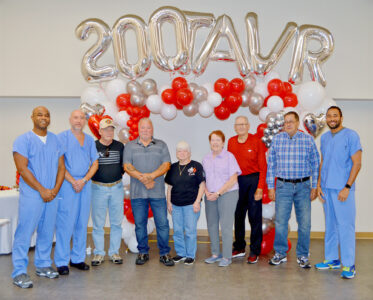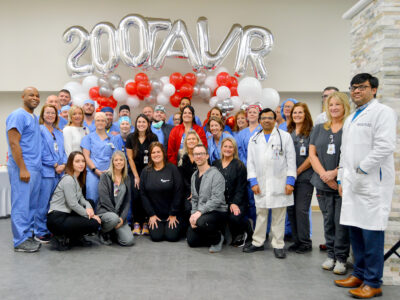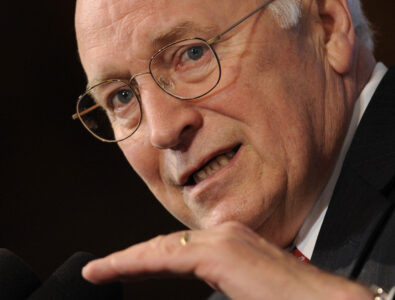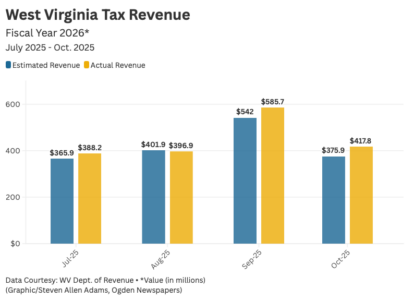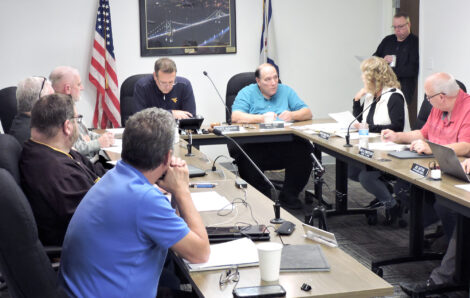Trinity celebrates 200th minimally invasive heart surgery
- PATIENTS — Physicians with Trinity Health System’s interventional cardiology division stood with Trinity’s previous transcatheter aortic valve replacement patients, celebrating the 200th TAVR performed at Trinity Tuesday. — Christopher Dacanay
- TEAM — Trinity Health System staff who are involved in the system’s transcatheter aortic valve replacement process celebrated the 200th TAVR performed at Trinity Tuesday. — Christopher Dacanay
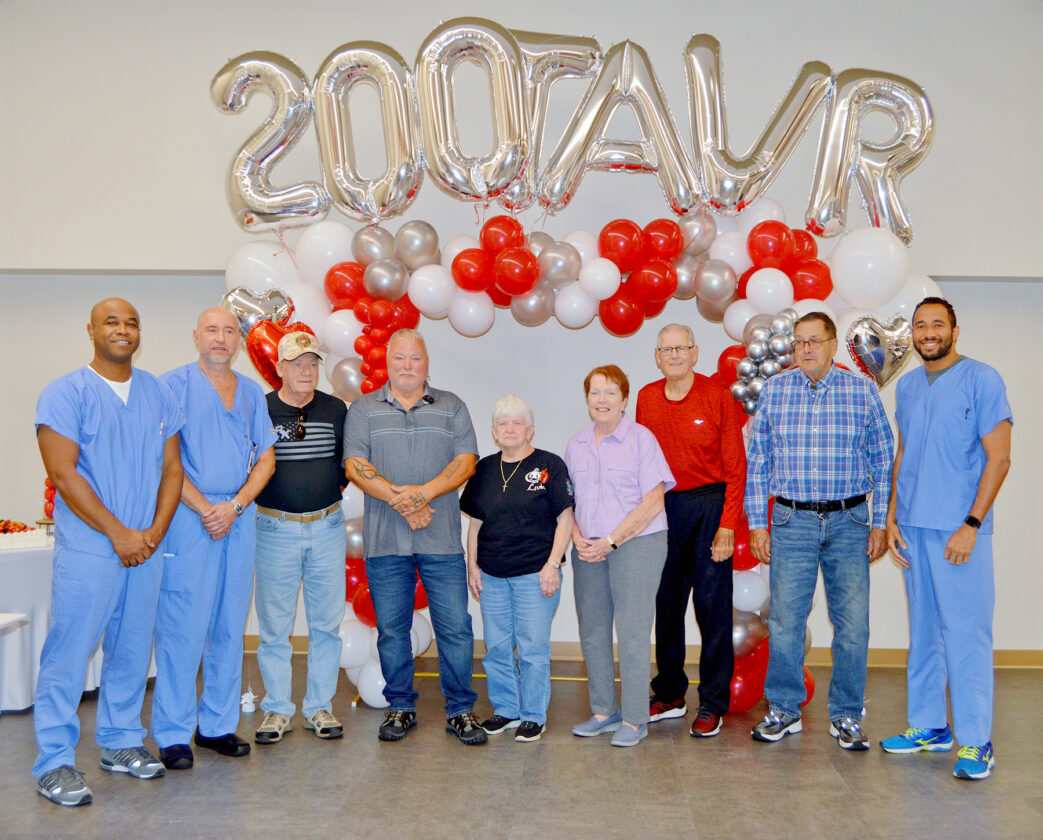
PATIENTS — Physicians with Trinity Health System’s interventional cardiology division stood with Trinity’s previous transcatheter aortic valve replacement patients, celebrating the 200th TAVR performed at Trinity Tuesday. -- Christopher Dacanay
STEUBENVILLE — Celebrating the 200th minimally invasive heart surgery performed at Trinity Health System to date, staff and patients noted the procedure’s success and benefits Tuesday.
Offered by Trinity since 2021, transcatheter aortic valve replacement is an alternative to open-heart surgery that does not require the surgical cutting of the sternum, known as “cracking the chest.” Instead, TAVR sees a catheter inserted through the patient’s blood vessel — usually in the chest or groin — to push out and replace the heart’s malfunctioning aortic valve.
As Trinity’s 200th TAVR patient recovered upstairs, physicians and previous TAVR patients gathered in Trinity Medical Center West’s main lobby to recognize the milestone.
Dr. Triston Smith of Trinity’s interventional cardiology division noted the fears and doubts that preceded the health system’s offering TAVR. Despite questions about viability, the system persevered to begin offering the procedure “because we knew this was something that was possible.”
Smith emphasized that the latest operation marked not only 200 TAVRs but 200 “successful” TAVRs, noting that all 200 patients have come out alive.
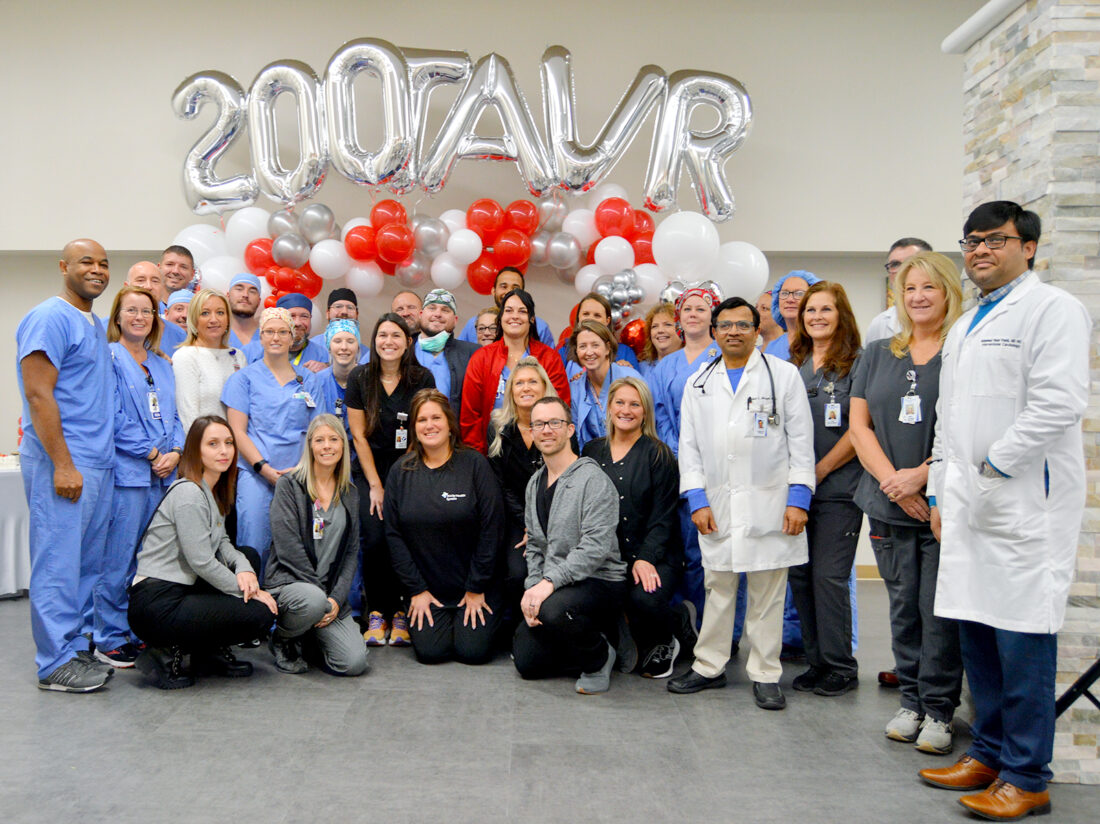
TEAM — Trinity Health System staff who are involved in the system’s transcatheter aortic valve replacement process celebrated the 200th TAVR performed at Trinity Tuesday. -- Christopher Dacanay
The median length of stay for Trinity’s TAVR patients is 1.2 days, Smith said, and patients have had a pacemaker rate of 0.5 percent, while pacemaker rates range from 12 to 30 percent nationally. Furthermore, patients have had no significant vascular or device complications.
“That says a lot,” Smith said, “because for us, doing these procedures is not just about numbers. They’re about quality outcomes because we want to make sure that for every patient that comes through our doors … (we) say, ‘We’re going to undertake this task, we’re going to complete it, we’re going to complete it well, (and) it’s going to be done as good as any other institution in this country.'”
Smith credited Trinity’s record of success to the implanting team and all others who “touched these patients from the time they’re referred from the time we send them out and follow up.” That includes the in-house echocardiogram technicians, nurse practitioners, physician assistants, office coordinators, operating room staff and administrators.
“As we look forward to the next 200 successful cases,” Smith said, “I want to thank each and every one of you who believes in us, who has confidence in us. I want to thank you, the patients, who had a choice but decided that you wanted to have your TAVR done here at Trinity.”
Also a member of the interventional cardiology team, Dr. Gregory Suero said that some patients have gone to other institutions for TAVRs and been told “it cannot be done” or had their TAVRS done elsewhere and “run into complications.”
“And, where did they come to get their successful TAVR? Here,” Suero said. “That’s the quality of the work of what we do. And we pour every single cent of love, care, compassion to get this done. It’s a team effort. … It’s a hard task to get from the beginning to the end, and we want to thank our patients and their families (for) putting their trust in what we do here.”
Suero challenged listeners to think about “the emotions you get in your stomach” when they think about cancer. Ironically, he said, severe aortic stenosis — or the narrowing of the aortic valve — has a worse prognosis than cancer if not treated. Patients have a better five-year survival rate with prostate, lung, colon and ovarian cancer compared to severe aortic stenosis, he said.
“When you guys think about the word ‘cancer’ and you get that feeling in your mind, aortic stenosis is something that we need to fear more because patients do not have the luxury of time, and sometimes it’s too late. So, that’s why recognition is extremely important and referral to a successful program, so it can be done safely with no complications.”
Dr. Victor Maevsky said he was “extremely privileged” to join Trinity’s team about three years ago, and it was only about a year ago that Trinity celebrated 100 TAVRs.
“I’m a cardiac surgeon. Nothing makes me more excited than to crack someone’s chest open,” Maevsky said. “But, I have to tell you, that all those 200 TAVR cases we performed — those are people who avoided cracking the chest and pain after the procedure.”
Trinity does perform a significant number of open surgical valve replacement for appropriate patients, typically those who are younger and have a certain pathology of their aortic valve, Maevsky said. Those patients tend to stay in the hospital between three and seven days, and they recover for “a long time.”
For TAVR patients, Maevsky said, many stay in the hospital overnight and leave the next day or the day after, returning to their daily routine and functionality “very, very quickly.” Seeing those patients’ quick recovery imparts an “unbelievable feeling.”
Another advantage of offering TAVRs at Trinity is the fact that patients no longer have to travel to Pittsburgh, Cleveland, Columbus or elsewhere to receive the procedure, Maevsky said.
“Those people who like this place, who want to stay in the Ohio Valley, who like Trinity and who would like to have this procedure here — that’s the most important thing. That’s what makes my heart melt because we know that a lot of people have significant difficulties getting around.”
Dr. Matthew Colflesh, Trinity’s chief medical officer, noted the discernment and practical evolution that goes into adding a new service at the hospital, and he said that the Congregation of the Sisters of the Holy Cross — who sponsored one of Trinity’s predecessors, Holy Cross Health System — would be proud of the system’s progress.
“We’re always looking to be better, and this is what (the 200th procedure) represented — this hospital, as a community hospital, trying to progress as far as it could for the people of our community,” Colflesh said.
Among a handful of previous TAVR patients present for Tuesday was Mike Heath, who underwent his TAVR six months ago.
Heath recalled the trouble breathing and weakness that he was experiencing. Various tests showed he needed to have his aortic valve replaced, a reality that caught him off guard.
Initially assuming he’d have to undergo open-heart surgery, Heath elected to have a TAVR done, recognizing the less time he’d likely have to spend in the hospital recovering.
Heath, who’s been a heart patient with Trinity for years, said he has no complaints about the procedure, adding, “The doctors took good care of me.” He noted it’s incredible to see what’s medically possible nowadays.
Tom Longwell had his TAVR seven months ago, after being told he’d be a good contender for the procedure. He chose to go with Trinity, having heard about its physicians’ positive reputations.
“I heard a lot of good about Dr. Suero and Dr. Smith,” Longwell said. “They perfected that technique and were having good luck with it.”
Regarding his choice to undergo a TAVR instead of open-heart surgery, Longwell said, “I think it was a great decision. I think anybody would take that route if their doctor said that’s what they should do.”

